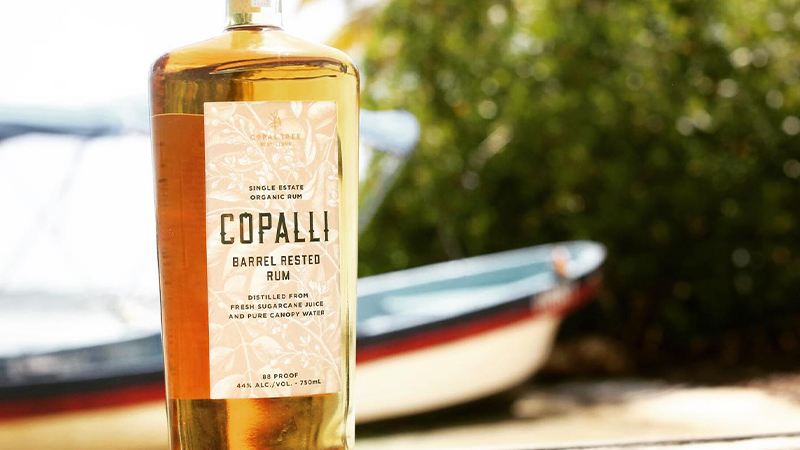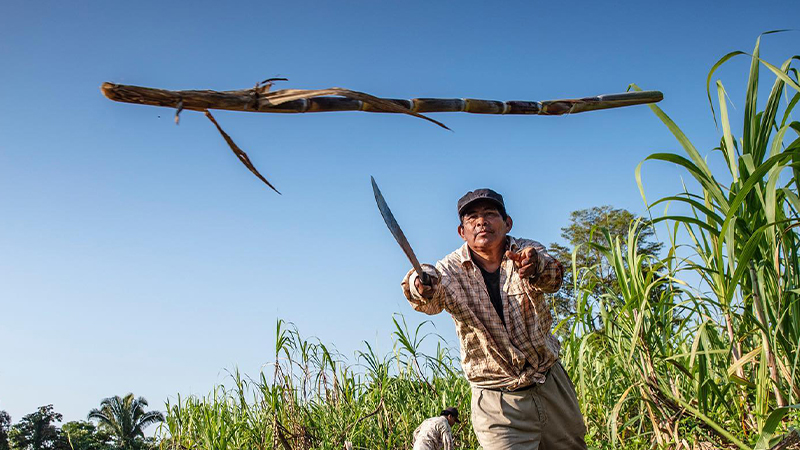
Copalli Rum understands that good things come in threes: Copalli White Rum, Copalli Barrel Rested Rum, and Copalli Cacao. All three rums are distilled using only fresh-pressed organic sugar cane, captured rainwater from the surrounding Belizean rainforest canopy, and yeast, while containing no added colorings or flavorings. The result is a standout trifecta of diverse rums that reflect the beauty and spirit of southern Belize, that can be enjoyed on the rocks, sipped neat, or mixed into cocktails.
However, to only mention Copalli’s dedication to sourcing high-quality, all-natural ingredients and superior taste would be a disservice to the brand’s remarkable story. From the get-go, Copalli Rum has been designed to be pure, clean, and sustainable — from the inside out. These are the underlying principles that have guided the brand long before it even existed.
While many brands talk the talk, Copalli is a prime example of a company that not only walks the walk but also creates a clear path others can follow. Every step of the way, co-founders Todd Robinson and Anya Fernald have considered how Copalli’s existence can benefit the local community and environment, now and in the future.

“The Copal Tree Distillery was built to have the smallest possible carbon footprint from day one, so sustainable practices are core to our operations,” says Mark Breene, CEO Copalli US. “While we aren’t fully carbon neutral yet, we are making progress in that direction and will continue to monitor and manage our footprint as our distribution grows; sustainability is a journey, not a finite point.”
For Copalli co-founder Robinson, the journey to crafting a truly sustainable, zero-waste spirit began decades earlier. In 2006, he purchased an eco-lodge set within a 22,000-acre nature preserve in southern Belize. Under his supervision, and with the help of Fernald, a successful values-driven food business entrepreneur, Copal Tree Lodge became a pioneer in agritourism and sustainability in Belize and beyond. Copal Tree Lodge operates as a champion of both the Belizean environment and the local Toledo District of Belize community. Sustainable practices, including growing indigenous heirloom crops, sourcing menu ingredients from the farm or local suppliers and fishermen, becoming the country’s first certified organic farm, repurposing fallen trees into furniture and other goods, highlighting local artisans, and employing local residents, are just a few of the ways the lodge gives back to the community and environment that host it.
In 2016, continuing their passion for developing sustainable and socially impactful businesses, Robinson and Fernald began designing an onsite distillery that would be zero waste. Together they built Copal Tree Distillery on the same transparent, eco-friendly, and community-conscious practices that made Copal Tree Lodge a leader in its industry.
“Sustainability isn’t the marketing program du jour for Copalli — it is part of our DNA,” says Breene. “While our U.S. availability is currently limited to New York, California, and Florida, supplemented by internet sales in other states, where legal, we hope to make emotional connections to consumers who believe as we do. And then we’ll spread the word, one cocktail at a time.”
Though it is common for many producers to make their rum using molasses, Copalli Rum is made from organic, non-GMO, heirloom sugar cane varieties that are grown and harvested nearby at Copal Tree Farms. This gives Copalli Rum a cleaner, slightly grassy taste that serves as a delicious tribute to the southern Belizean rainforests from which it is produced. Within hours of hand harvesting, the sugar cane is pressed, the juice is fermented with all-natural yeast, and then double distilled.
Copalli White Rum is distilled in both pot and column stills and then rested in stainless steel, while Copalli Barrel Rested Rum is, well, rested in American oak ex-bourbon barrels for eight to 10 months after being distilled in full-bodied pot stills. To make the brand’s newly released and unique Copalli Cacao, white rum is infused with 100 percent organic cacao nibs grown and harvested at Copal Tree Farms and then distilled one more time.

If you think the rum is impressive, hold onto your cocktail napkins because the distillery is downright inspiring. Designed as a zero-waste facility, Copal Tree Distillery is powered by the leftover materials from the production process. Pressed sugar cane fibers are repurposed and burnt in the distillery broiler, and the resulting ash is put to use as fertilizer. Additionally, any wastewater is re-filtered and either used to water Copal Tree Farm crops or relocated safely into retention ponds.
“When Copalli was created, concern for the community and the environment came long before the rum,” explains Breene. “Our two founders wanted to improve the environment of the rainforest, but they realized for lasting progress to be achieved, economic development and environmental stewardship had to take place at the same time.”
This vision led Robinson to establish Copalli’s eco-friendly practices and set up Copal Tree Distillery as a trust for the local community, allowing profits to be distributed back to the community by way of educational grants and funding for conservation initiatives. And, since every step of the production process from farming to bottling is done on site, together with the Lodge, and the organic farm, Copalli Rum is the largest non-government employer in southern Belize.
Whether you’re sipping or stirring Copalli White Rum, Copalli Barrel Rested Rum, or Copalli Cacao, drinking responsibly just took on a whole new meaning.
This article is sponsored by Copalli Rum.